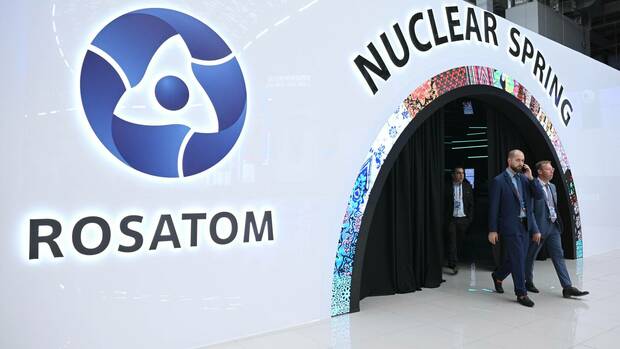Dusseldorf, Munich The European Union (EU) has sanctioned or shut down the purchase of coal, natural gas and oil from Russia. But the Russian nuclear industry, of all things, has so far been largely exempt from sanctions.
Not only does the Russian state-owned company Rosatom benefit from this, but also European companies such as the French nuclear power operator Framatome and the Munich-based technology specialist Siemens Energy, criticizes the non-governmental organization Greenpeace in a new report that has been made available to the Handelsblatt in advance.
“Major European companies have ongoing contracts worth hundreds of millions of euros to export their cutting-edge technology and expertise to Russian nuclear power plants and Rosatom’s nuclear projects abroad,” Greenpeace said. EU companies “contribute directly to maintaining and expanding Rosatom’s business by providing their technology and expertise – and thus indirectly to the continuation of the attack on Ukraine”.
The organization calls for such transactions to be sanctioned. Existing contracts would also have to be terminated.
The control technology is the brain of the power plant
One point of criticism: Siemens Energy has orders to supply control technology for Rosatom’s nuclear projects in other countries. According to Greenpeace, only with the help of Western control technology systems, which are the brain and nervous system of the reactor, did Rosatom “rise to become the world’s largest supplier of nuclear power plants under construction”.
Siemens Energy acknowledged the contracts with Rosatom at the beginning of the year and “showed no ambition whatsoever to terminate them,” criticized Greenpeace activist Shaun Bernie in an interview with the Handelsblatt.
In 2021, Rosatom had $140 billion in orders to build nuclear power plants abroad. Despite the war in Ukraine, there are still plans to build new nuclear power plants, for example in Paks, Hungary. Here, too, Siemens Energy is involved and is to supply the central safety and monitoring equipment for the nuclear power plant, as well as for the Akkuyu nuclear power plant in southern Turkey.
“By supplying important components for Rosatom’s Paks II nuclear power plant project in Hungary, Siemens Energy would actively support warmongers and increase Europe’s dependence on Russia,” criticizes Sebastian Roetters from the environmental protection organization Urgewald.
>> Read here: Russia is selling oil above the EU oil price limit again for the first time
In the environment of Siemens Energy it was said that the group was not doing any new business with Russia. Otherwise, contracts would have to be strictly adhered to as long as politics permitted the settlement. This is a signal of reliability to all customers. The group has not been represented in the “hot” nuclear technology for a decade, but only in the so-called operational control technology.
These control systems ensured the monitoring and control of the power plant in normal operating mode. “This is explicitly not affected by the EU sanctions, so the primacy of politics applies here.”
European countries are said to have pushed for supplies of Western technology
On the contrary: According to a Siemens Energy spokesman, the company was “explicitly asked by various state governments within the EU to supply our control technology for the Paks II project in Hungary, even after Russia’s attack on Ukraine”. There are only a few competitors in the control systems, for example from Russia itself or from China.
Moscow and Kiev accuse each other of preparing an attack on the Zaporizhia nuclear power plant in southern Ukraine.
(Photo: Maxar Technologies)
Siemens Energy has the only system that can prove qualification and certification according to European norms and standards as well as the International Electrotechnical Commission. In addition, Siemens Energy is the only company with many years of operational experience. All new nuclear projects in Europe since the year 2000 have relied on control technology from Siemens Energy. “In addition, we are the only provider that is not under any state influence, so that we can ensure independence, especially in the area of cyber security.”
The contracts for the delivery of the control technology in the consortium with Framatome were concluded in 2019 and 2020. There are currently no deliveries as the German Federal Office of Economics and Export Control (BAFA) has not yet decided on the application for an export license.
At the request of the Handelsblatt for the reasons for the delay, the authority refers to the Federal Ministry of Economics. According to a spokesman for the ministry, no information can be given on “individual processes of export control”.
Greenpeace fears military use
Since the outbreak of the war of aggression against Ukraine, the European Union has imposed a series of sanctions on Russia. For example, coal and oil can no longer be imported from Russia.
Shortly after the outbreak of war, the EU Parliament called for “an immediate, complete embargo on Russian imports of oil, coal, nuclear fuel and gas”. At the time, it was said that “the cooperation with Russian companies in existing and new nuclear projects should be ended”.
Ukrainian President Volodymyr Zelensky has also repeatedly called on Brussels to impose sanctions on Russia’s nuclear industry.
Economics Minister Robert Habeck also spoke out in favor of sanctions in April in view of Europe’s dependence on Russian uranium. According to the Green politician, Moscow can no longer be regarded as a reliable partner. Nothing has happened to this day.
Rosatom is also responsible for the country’s military nuclear program and also emphasizes this “dual benefit”. Greenpeace fears that Siemens Energy technology will also be used in Russia’s nuclear program.
Siemens Energy considers this to be impossible without the deliberate circumvention of export permits by third parties. “We have not installed any control technology in Russian nuclear power plants for more than 20 years and we do not deliver any control technology to Russia,” said a spokesman.
Assistance: Klaus Stratmann
More: Destroyed dam poses a threat to Europe’s largest nuclear power plant

